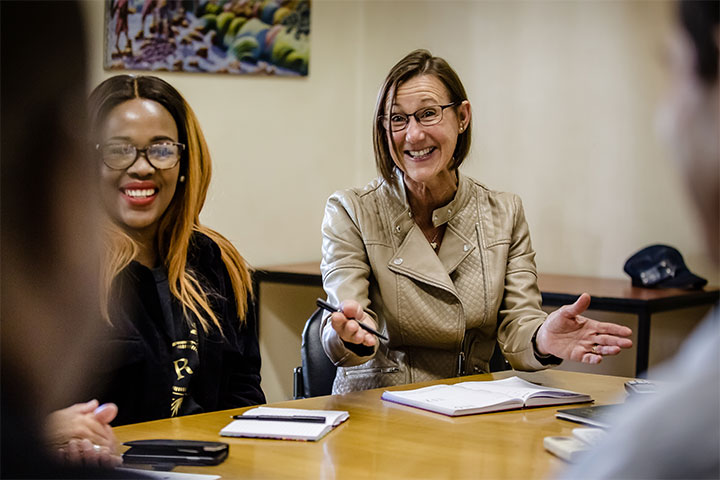The HIV epidemic in Southern Africa has changed considerably in the past 20 years. How?
Even though the incidence rate of HIV infection has declined dramatically in the past few years, Zimbabwe still encounters the challenges faced in the initial phase of the HIV epidemic. Many people are being newly diagnosed with HIV and of those a lot of patients presenting with advanced HIV disease. But fortunately, there is also good news to share! Life expectancy has increased, as people have better access to testing and medications that are more patient-friendly — people take a single tablet a day and there are fewer side effects than with previous medication regimens.
In what way does the improved life expectancy influence people living with HIV?
As people with HIV are now living longer, non-communicable diseases such as cancer, diabetes, and high blood pressure are on the rise. Also, the aging process in people living with HIV is faster and they frequently develop geriatric-related health issues earlier than their HIV-negative counterparts. HIV treatment at Newlands Clinic is very successful, but these recent observations threaten the gains that have been made thanks to effective antiretroviral therapy regimens. To ensure the good health of our patients, we must incorporate the prevention and treatment of non-communicable diseases into our treatment. We also must closely monitor the aging process of our elderly patients and integrate their geriatric needs into our comprehensive care package. This makes our work with HIV-positive people at Newlands Clinic complex.
How does Newlands Clinic address the shift in treatment of people living with HIV?
We have developed different strategies to respond to the emerging challenges. We have introduced the annual visit, where each patient has a thorough physical examination, including screening for non-communicable diseases and cancers. Additionally, the Mental and Social Health department has expanded its human resources, and mental health disease screening is now incorporated into routine care. Furthermore, we have launched a geriatric clinic, as older patients require a more in-depth assessment. At the geriatric clinic, we conduct screening for common older age-related problems such as visual and hearing challenges, dementia, frailty, and sexual dysfunction.
Over the past few years, Newlands Clinic has also started to improve catering to men. Why?
In Africa, HIV has disproportionately affected and still affects women, and we were more aware of challenges faced by women and less so for men. But unless we focus more on catering to the needs of men, we will not attract them to come into Newlands Clinics’ care, and the HIV epidemic will not be controlled. That is why in March 2023 we launched a Men’s Health Clinic (MHC) where men are attended to by specially trained staff. The aim of the MHC is to discuss sexual reproductive health issues and provide screening, diagnosis, and management of these conditions as they arise.
What role does the research of Newlands Clinic play regarding these current changes in HIV treatment?
We use the information gathered through research to adapt our training curriculum for doctors and nurses who are educated in our Newlands Clinic Training Centre. We think that this impacts the way they look after patients with HIV and therefore has a national impact I would say. But we also present our research at national and international conferences to contribute to the improvement of HIV treatment and care of patients worldwide.
What will be the greatest challenges in upcoming years concerning the treatment of HIV?
It has been and always will be difficult to retain people in long-term care, especially as the economic situation worsens and people leave to find work and safety in other countries. Also, managing complex non-communicable diseases requires significant resources and clinical skills. We are also looking for more user-friendly treatments such as long-acting injections. That would make a lot of things easier.
HIV in Africa
The African epidemic differs from the European epidemic. In Africa, it is predominantly heterosexual individuals who are infected. The epidemic is driven by key populations such as sex workers and young people and is accelerated by poor socio-economic conditions. Limited access to diagnostics, care, and treatment results in people suffering from advanced HIV disease. Stigma remains firmly entrenched in many communities, impacting health-seeking behaviours. It results in people with HIV accessing health services only when they have advanced HIV disease, including cancers.


